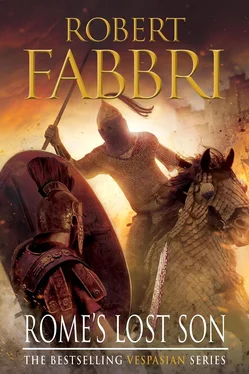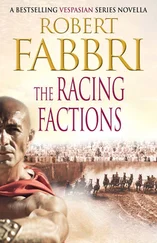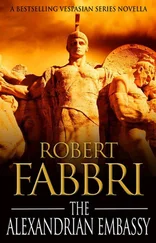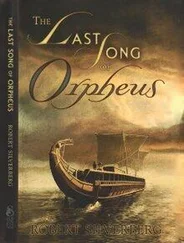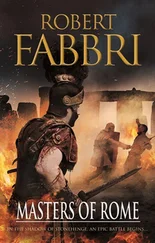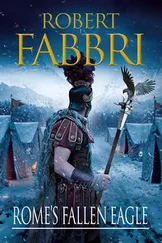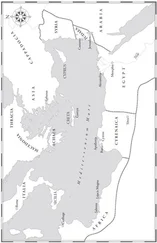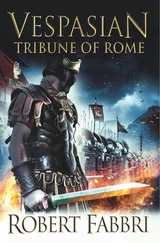Robert Fabbri - Rome's lost son
Здесь есть возможность читать онлайн «Robert Fabbri - Rome's lost son» весь текст электронной книги совершенно бесплатно (целиком полную версию без сокращений). В некоторых случаях можно слушать аудио, скачать через торрент в формате fb2 и присутствует краткое содержание. Год выпуска: 2015, ISBN: 2015, Издательство: Atlantic Books, Жанр: Исторические приключения, на английском языке. Описание произведения, (предисловие) а так же отзывы посетителей доступны на портале библиотеки ЛибКат.
- Название:Rome's lost son
- Автор:
- Издательство:Atlantic Books
- Жанр:
- Год:2015
- ISBN:9780857899668
- Рейтинг книги:5 / 5. Голосов: 1
-
Избранное:Добавить в избранное
- Отзывы:
-
Ваша оценка:
- 100
- 1
- 2
- 3
- 4
- 5
Rome's lost son: краткое содержание, описание и аннотация
Предлагаем к чтению аннотацию, описание, краткое содержание или предисловие (зависит от того, что написал сам автор книги «Rome's lost son»). Если вы не нашли необходимую информацию о книге — напишите в комментариях, мы постараемся отыскать её.
Rome's lost son — читать онлайн бесплатно полную книгу (весь текст) целиком
Ниже представлен текст книги, разбитый по страницам. Система сохранения места последней прочитанной страницы, позволяет с удобством читать онлайн бесплатно книгу «Rome's lost son», без необходимости каждый раз заново искать на чём Вы остановились. Поставьте закладку, и сможете в любой момент перейти на страницу, на которой закончили чтение.
Интервал:
Закладка:
Sabinus vaulted the rail and landed on the stricken ship; he drew his sword and strode towards the line of the melee, which had now almost reached the mainmast, past the many dead and wounded left in its wake. The ship lurched, as the bireme managed to pull itself free, and then settled, tilted markedly towards the side with the gaping rend. Sabinus stumbled but righted himself; his stomach heaved again with the rocking of the ship. A slight movement of a dying man just to his left caused Sabinus to pause and press the tip of his sword into the man’s throat, grinding the blade left and right, not wanting to be attacked from behind by an enemy feigning incapacity. He withdrew his weapon, with a gurgle of air bubbling through thick liquid, and went to move on but then stopped abruptly. He peered down at the man’s face in the gloom. It was bearded; but with a full, Greek-style beard, not the more shaped version sported in Parthia. He looked down at the man’s legs: he was wearing eastern trousers and yet they were not partially covered by a long tunic. He glanced around; all the enemy dead wore trousers but none of them had eastern-style tunics or beards, nor were they armed in the Parthian manner — scale armour, wicker shields, bows and short spears and swords — but, rather, in the Greek style of the northern Euxine — oval thureos shield, javelin and short sword. Sabinus cursed under his breath and then ran back to where the enemy trierarchus lay; he had a beard the colour of copper, natural, not dyed. That settled it: he was definitely not Parthian.
This was not the ship carrying the embassy.
As panic rose in his throat he ran to the rail and looked out; to larboard he could make out that one of the escort ships had been grappled by a bireme, but to starboard he could see nothing. Behind him Thracius’ troops broke the remaining resistance of the ships’ marines.
‘I want prisoners!’ Sabinus shouted as the centurion hacked and slashed his way into the retreating enemy, his men reaping bloody harvest to either side. He sprinted into the rear of the marines and barged his way through, manhandling men out of the way, screaming at them to take prisoners, until he reached Thracius. ‘Prisoners! I must have a couple of prisoners.’
The centurion turned back to him and nodded, his eyes wide with killing-joy and his face and arms smeared in blood; he shouted at the men to either side and they charged forward, following up the defeated foe. Sabinus trailed them, checking the bodies of the fallen to see if there was enough life left in one to be able to furnish him with the information he was now desperate for. He cursed himself for allowing his seasickness to cloud his mind: in his weakened state, he had assumed that the Parthian embassy would just try to sneak past his flotilla and had not considered the possibility of a diversion. Which of the other two ships held the ambassadors?
Then that word suddenly echoed in his head: diversion, diversion. Bile surged in his throat and this time it was not from the ship’s motion: he had been duped; none of these ships contained the Parthians. He ran forward to the bow where Thracius and his men were disarming the last two dozen or so of the enemy; he looked out to the north as the first vestiges of dawn warmed the thick cloud blanket above.
‘Where do you want to question them, sir?’ Thracius asked, thrusting a prisoner down onto his knees, pulling his hair back and placing a bloodied blade on the exposed throat.
Sabinus stared, forlorn, at the sleek little liburnian, just visible in the growing light, under full sail and oars, running past them a quarter of a mile away at a speed that neither the trireme nor the biremes could hope to match for very long. ‘I don’t need to any more. Finish them.’
A scream of terrified pleading erupted from the prisoners as the first was despatched, and Sabinus felt a stab of disgust at himself for ordering their deaths solely out of pique at being outsmarted. ‘Hold, Thracius!’
The centurion arrested his stroke as the tip of his sword pricked the throat of a second shrieking prisoner and looked back at his superior.
‘Throw them into the water; they can take their chances with the rest. Then get your men back to our ship.’
As the marines obeyed the order, Sabinus walked back to the trireme, calculating just how he would frame what he knew would be a very difficult letter to Pallas, Claudius’ favoured freedman and the real power behind the throne of a drooling, malleable fool. Not even his brother Vespasian, who, thanks to the influence of Pallas, was due to become suffect-consul for the last two months of the year, would be able to protect him from the wrath of those in power.
And their wrath would be justified.
Sabinus was under no illusions; he had failed catastrophically and the embassy was now on its way to report back to the Great King in his capital, Ctesiphon, on the Tigris.
There would be no way to hide his guilt. It was a certainty that Pallas also had agents amongst the Dacians and news of the embassy and Sabinus’ failure would reach him within the next month or two. It was also a certainty that Narcissus and Callistus, Pallas’ fellow freedmen and rivals whom he had outmanoeuvred, by making Agrippina empress, and relegated to second place in Claudius’ pliable estimation, would also hear of Sabinus’ failure. They would be sure to use it as a political weapon in the vicious infighting that pervaded the imperial palace.
Sabinus cursed the weakness of the Emperor that gave rise to such combustible politics and he cursed the men and women who took advantage of that weakness for their own gain; but most of all he cursed his own weakness: the nausea he felt each time he stepped onto a ship. Tonight that weakness had addled his mind and caused him to make a mistake.
Because of that weakness he had failed Rome.
PART I
CHAPTER I
Persistent and shrill, the cry echoed around the walls and marble columns of the atrium; a torment to all who endured it.
Titus Flavius Vespasianus gritted his teeth, determined not to be moved by the pitiful wail as it rose and fell, occasionally pausing for a ragged breath before bellowing out again with renewed, lung-filled vigour. The suffering that it conveyed had to be borne and Vespasian knew that should he not have the stomach for it he would lose the ongoing battle of wills; and that was something that he could not afford to do.
A new cacophony of anguish emitted from the writhing bundle in his wife’s arms, its movements caught in the flickering glow of the log fire spitting and crackling in the atrium hearth. Vespasian winced and then held his head high and crooked his left arm before him as his body slave draped his toga over and around his well-muscled, compact frame, watched by Titus, Vespasian’s eleven-year-old son.
With the heavy woollen garment eventually hanging to his satisfaction and the howls showing no sign of abating, Vespasian eased into the pair of red leather, senatorial slippers that his slave held out for him. ‘The heels, Hormus.’ Hormus ran a finger around the back of each shoe so that his master’s feet fitted snugly and then stood and backed away with deference, leaving Titus facing his father.
Doing his best to remain calm as the din reached a new level, Vespasian contemplated Titus for a few moments. ‘Does the Emperor still come every day to check on his son’s progress?’
‘Most days, Father; and he also asks me and the other boys questions, as well as Britannicus.’
Vespasian flinched at a particularly shrill bawl and strove to ignore it. ‘What happens if you get them wrong?’
‘Sosibius beats us after Claudius has gone.’
Читать дальшеИнтервал:
Закладка:
Похожие книги на «Rome's lost son»
Представляем Вашему вниманию похожие книги на «Rome's lost son» списком для выбора. Мы отобрали схожую по названию и смыслу литературу в надежде предоставить читателям больше вариантов отыскать новые, интересные, ещё непрочитанные произведения.
Обсуждение, отзывы о книге «Rome's lost son» и просто собственные мнения читателей. Оставьте ваши комментарии, напишите, что Вы думаете о произведении, его смысле или главных героях. Укажите что конкретно понравилось, а что нет, и почему Вы так считаете.
